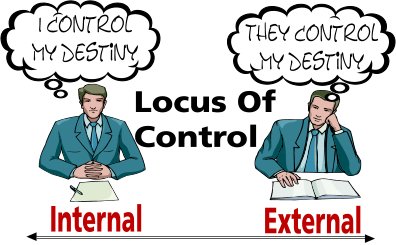- a psychological concept that refers to how strongly people believe they have control over the situations and experiences that affect their lives.
- How students perceive the causes of their academic success or failure in school.
- Students with an “internal locus of control” are widely considered that their success or failure is a result of the effort and hard work they invest in their education. Students with an “external locus of control” generally believe that their successes or failures result from external factors beyond their control, such as luck, fate, circumstance, injustice, bias, or teachers who are unfair, prejudiced, or unskilled.For example, students with an internal locus of control might blame poor grades on their failure to study, whereas students with an external locus of control may blame an unfair teacher or test for their poor performance.
Internal Locus: considered more likely to work hard in order to learn, progress, and succeed.
External Locus: more likely to believe that working hard is “pointless” because someone or something else is treating them unfairly or holding them back. Students with an external locus of control may also believe that their achievements will not be recognized or their effort will not result in success.
Locus of control is connected to a variety of psychological concepts, theories, and findings, including learned helplessness, which is when a person has learned to act as if they are helpless even when they actually have control over their situation or the power to change a circumstance or outcome. Some psychologists believe “externals” are more likely to develop learned helplessness than “internals.”
Main methodologies that schools use when handling learning-disabled students who have an external locus of control:
- Altering learning contexts:More organized, orderly, and supportive classrooms and learning environments are believed to benefit students with an external locus of control, while students with an internal locus of control often thrive in more unstructured learning environments.
- Strengthening internal locus of control:Teachers and experts may also use a variety of strategies to encourage students to believe they have more control over their education and academic achievement, including techniques known as “attribution training.” Essentially, students are taught to internalize positive messages that tend to be intuitive to students with an internal locus of control. For example, the training may encourage students to say to themselves—out loud at first, then in a whispering voice, and then silently to themselves—that they can do the task they were assigned and that their hard work and effort will be rewarded with success.
Numerous questionnaires have been developed to help recognize whether students tend toward an internal or external locus of control. Julian B. Rotter, the psychologist who originally developed the locus-of-control concept, created an extensively used question-based assessment and a corresponding scale designed to identify where students are on the internal-external spectrum. The questionnaire offers a series of choices between two statements. For example, the respondent would choose between “I have often found that what is going to happen will happen” or “Trusting to fate has never turned out as well for me as making a decision to take a definite course of action.” Rotter’s assessment is one of a number of diagnostic tools and scales that may be used by psychologists and educators.
